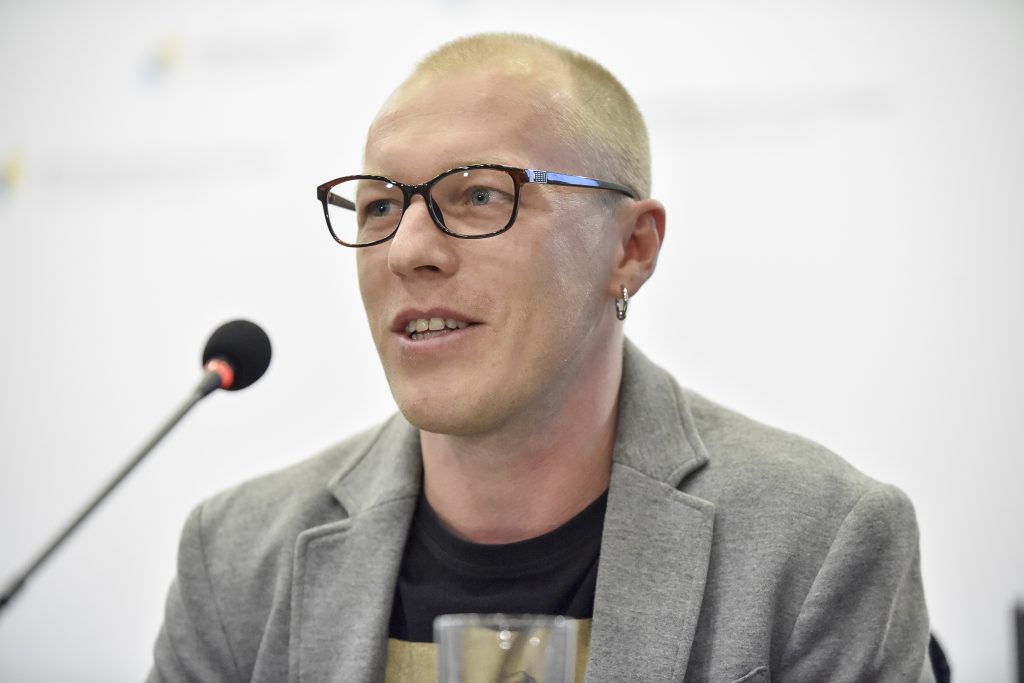65% of the defense motions in cases of the Crimean political prisoners were rejected by the courts of occupation authorities, while 80% of the motions of the prosecution were granted. This is one of the conclusions of the monitoring of court hearings in occupied Crimea, presented in the report “The Crimean Process: Problems of Compliance with the Standards of Fair Justice in Politically Motivated Cases”, which was presented at Ukraine Crisis Media Center. “Most motions filed by the prosecution were about allowing witness statements without their presence (…) and judges granted those motions. Most motions filed by the defense team were about studying evidence: from the appointment of examinations to interrogations of witnesses, and such motions were not passed in most cases,” said Mykhailo Batrak, co-coordinator of the initiative “Crimean Process”.
As a part of monitoring, human rights activists analyzed 8 cases of Crimean political prisoners – Volodymyr Baluch, Suleiman Kadyrov, Igor Movenko, Yevhen Panov, Mykola Semena, Ilmi Umerov, Akhtem Chiygoz and the case of “26th of February”. The experts conducted a general analysis of each of the four standards of fair justice: consideration of the case by an independent and impartial tribunal, established in accordance with the law, presumption of innocence, right to a public hearing and equality of the parties.
“Key conclusion – and this is confirmed by our study – is that the court created under the conditions of occupation in Crimea is not an effective protection and cannot provide effective protection precisely in politically motivated cases,” said Daria Svyrydova, lawyer of the Ukrainian Helsinki Human Rights Union – The creation of courts in occupied territories, which breaks international humanitarian law and the procedure for recruiting judges that took place in occupied territories in violation of certain basic principles for the selection of judges, created in their own procedures a system, which did not allow the selection of independent judges and did not allow the courts to serve justice in compliance with IHL norms and using not the occupant’s law, but Ukrainian one. ”
Regarding the second principle, the presumption of innocence, Maria Yasenovska, president of the Kharkiv Regional Foundation “Public Alternative”, noted that “there are several rulings of the European Court of Human Rights, which ruled against Russia, that clearly state that detention of the accused in cages is not just a violation of the presumption of innocence, but is a fact that creates the image of a guilty person in the eyes of the court and the public alike and violates Article 6 of the European Convention on Human Rights.” According to her, keeping defendants in so-called “aquariums” is not an effective improvement in the implementation of these norms; however, both of these methods of detaining political prisoners were used during court hearings. Also, Maria Yasenovska reported that there were recorded cases of violation of secrecy of judge’s chambers, like when before the sentence was announced, prison staff would arrive to pick up the defendants.
One of the conditions for the principle of equality of the parties is to allow the accused to attend the meetings. “In the case of Akhtem Chiygoz, monitors visited 70 court hearings, but the defendant was present in none of them, this 44% of all the hearing [for this case],” said Serhiy Burov, executive director of the Educational Human Rights House in Chernihiv. He noted that as a result of non-compliance with this principle, the accused cannot fully participate in the process. The significant disparity of the number of granted motions for prosecution and defense is also a violation of this rule. Serhiy Burov also told about how judges could “help” witnesses for prosecution by clarifying questions or explanations, could forbid responding to certain questions from the lawyers, as well as frequently allow using statements of anonymous witnesses.
Serhiy Ostaf, expert of the Resource Center for Human Rights (CReDO) from Chisinau, spoke about violations of the right to a public hearing. These included incomplete or incorrect publications on the circumstances of court sessions, administrative or technical barriers to presence of general public during hearings, the ability to make audio recordings for present parties, including the media, moreover this right might not had been even be granted to the defense after an official request. Serhiy Ostaf cites as the most serious violation incomplete publications of court decisions after their issuance, which sometimes lacked important components of the justification of certain decisions. “What we have seen is not just a recurring practice of breaching these standards. (…) One can talk about a certain level of systemic violation, which does not apply to every single case, but to all of them in general,” the expert said.
Ilmi Umerov, deputy chairman of the Mejlis of the Crimean Tatar people and former political prisoner of Kremlin, who was also present during the briefing, noted that there were cases, including his trial, when the judge’s sentence exceeded the amount of punishment requested by the prosecution. According to him, there is also pressure on the lawyers that exists in order to discredit them or detain them from the case for certain periods of time. “A lawyer cannot balance out the [fairness of the trial] in the sense of implementing the law either in Crimea or elsewhere in Russian Federation – they are more needed to monitor the situation in order to provide information on the violation of the rights of the accused and to provide contact with a political prisoner […] There is no justice, we were not waiting for it and are never waiting for it, I can declare with full responsibility that there are no courts in Russian Federation, in particular in temporarily occupied Crimea, – they all carry out the FSS [Federal Security Service of Russian Federation] orders, ” summed up Ilmi Umerov.




